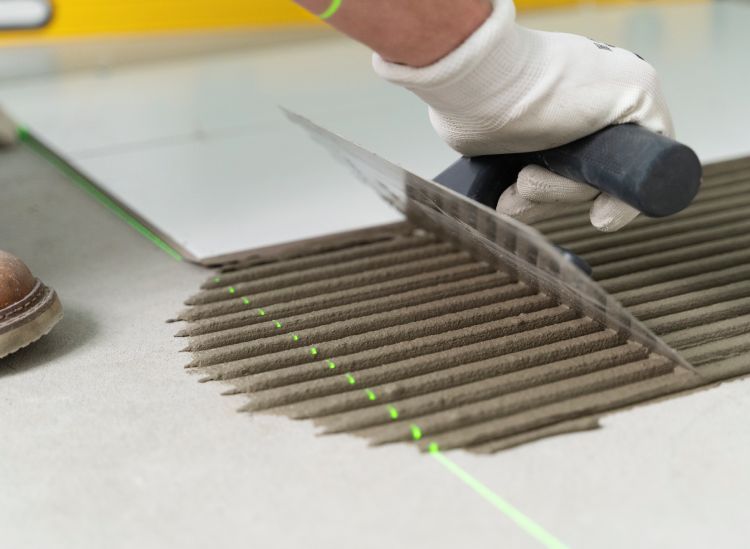
Offering both functional and aesthetic benefits, tiling is integral to any home and building design. It helps boost a residential or commercial space’s visual appeal and overall look while protecting the surfaces from harmful elements.
In this guide, we will explore the world of floor tiling, its purpose, and its difference from waterproofing to help you understand more about the process. We will also give tips for choosing the right tiling material for your home or commercial property.
What Is Floor Tiling?
Floor tiling involves covering a surface with tiles made of ceramic, porcelain, stone, or other materials. Tiles used for this procedure come in different sizes, colours, and textures, which offers endless design possibilities for residential and property owners.
Experts recommend kitchen, entryway, living space, and bathroom floor tiling to provide a versatile solution that can withstand high traffic, moisture, and wear.
Aside from improving the visual appearance of the space, tiling also services practical functions, such as the following:
- Durability: Floor tiles are ideal for areas with heavy foot traffic because tiles add more durability to the surfaces, making them less susceptible to wear and tear.
- Easy Maintenance: Properties need maintenance to retain their cleanliness and condition. With tiled floors, you won’t have a hard time cleaning and maintaining the surfaces. You just need to do regular sweeping and occasional mopping.
- Heat Resistance: Apart from water and moisture resistance, tiles are also heat resistant. They can withstand high temperatures. That is why they are suitable for areas with heat exposure, like kitchens. Moreover, some tiling materials are fire-resistant.
- Water and Moisture Resistance: Several tile materials, including ceramic and porcelain, are water-resistant. Properly sealed tiled surfaces offer excellent protection against moisture, making them suitable for kitchen tiling, bathroom floor tiling and other areas prone to spills and water exposure.
- Hypoallergenic Properties: Unlike carpets, tiles don’t trap dust, dander, pollens, and other allergens, making them a more hygienic option for those with allergies.
- Property Value: Tiled floors can enhance the value of a property due to their durability, aesthetic appeal, and low maintenance requirements.
Is Tiling the Same as Waterproofing?
Tiling and waterproofing may be related, but they are distinct processes in construction and interior design.
While tiling provides a certain level of water resistance, it is not the same as waterproofing. Waterproofing involves applying a specialised barrier to prevent water penetration into the substrate. Combining floor tiling with proper waterproofing is crucial in areas like bathrooms to prevent water damage.
To be more specific…
Tiling involves covering a surface with tiles made from various materials to enhance its durability, aesthetics, and functionality. Tiling contractors lay down tiles on a prepared surface using adhesive, grout, and sealant. While tiles can be water-resistant, the spaces between them and the substrate may not necessarily be waterproof.
Meanwhile, waterproofing is a specific technique or treatment used to make a surface impermeable to water. It involves applying specialised membranes, coatings, or sealants to prevent water from seeping through the substrate or the gaps between tiles. Waterproofing is crucial in areas with high water exposure, like showers, bathroom floors, and surrounding bathtubs.
Choosing the Right Tile Material
It is crucial to choose the right tile material to ensure that the tiles will serve their purpose. Common materials include the following:
Ceramic Tiles: Made from clay and other natural materials, ceramic tile flooring is the usual choice among property owners because of its versatility and affordability. They are available in a wide range of colours and designs.
One good thing about ceramic tiles is that they are usually easy to clean and maintain, making them the best choice for bathroom and kitchen floor tiling. However, they are less durable than other tiles and may crack under heavy impact.
Stone Tiles: From the name itself, stone tiles are from natural stones, such as granite, marble, limestone, or slate. If you’re worried about its appearance, remember that each type of stone tile has its unique look and texture.
Additionally, stone tiles are highly durable and can add a luxurious, natural aesthetic to any space. However, they are generally more costly and may require regular sealing to prevent stains and moisture damage.
Glass Tiles: Known for their reflective and translucent qualities, glass tiles are often used for accent walls, backsplashes, and decorative purposes. They also come in various colours and finishes, which can create a light, airy feel. Glass tiles are resistant to stains and moisture but can be more fragile than other tiling materials.
Porcelain Tiles: Porcelain floor tiles are a type of ceramic tile but with a more refined material. They are known for their strength and moisture resistance.
Because they are denser and less porous than regular ceramic tiles, porcelain tiles are ideal for high-traffic areas and outdoor use. They are also resistant to wear and tear, scratches, and stains.
Cement Tiles: Made from a mixture of cement, sand, and natural pigments, property owners usually choose cement tiles for their bold patterns and colours. They are highly durable and perfect for creating a custom, artisanal look. However, they must be sealed to prevent staining and moisture absorption.
Mosaic Tiles: Mosaic tiles are typically small and made from glass, ceramic, stone, or other materials. Its common use is for decorations, especially in bathrooms, kitchen backsplashes, and swimming pools.
While mosaic tiles allow for excellent design flexibility, they can be labour-intensive to install. So, you may incur higher floor tiling costs if you’re hiring a tiling contractor.
Vinyl Tiles: These are synthetic tiles made from PVC materials. Vinyl floor tiles are affordable, easy to install, and come in various designs, including those that mimic wood, stone, or ceramic. They are comfortable underfoot and resistant to water and stains.
Tips to Keep in Mind When Choosing Tiles
- Consider its usage. Remember, it isn’t always about aesthetics. If you’re using the tiles in wet areas, choose the ones with good water and slip resistance.
- Make sure that the tile size complements the room’s size. You may ask for an expert’s opinion to make it easier for you.
- Consider your home’s overall colour scheme and style to ensure the tiles complement your decorations.
- Take a look at your budget and think about the cost of tiling services in Brisbane and materials. Doing so will help you narrow your options.
- If possible, get sample tiles and take them home. This way, you can see how the tiles will look in the actual lighting of your room alongside your house’s overall visual appearance.
Transform Your Space Today with Superior Waterproofing!
If you want to elevate your space with exquisite tiling while ensuring top-notch waterproofing for lasting quality, Superior Waterproofing is your way to go! Explore the seamless combination of style and functionality with our expert floor tiling and waterproofing services. Feel free to call us at +61468760750 or email us at info@superiorwaterproofing.com.au to learn more.
